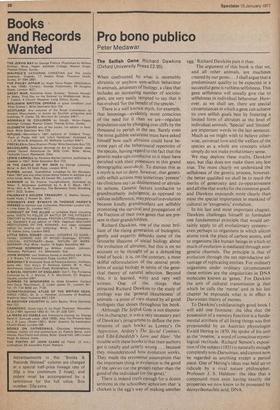Pro bono public()
Peter Medawar
The Selfish Gene Richard Dawkins (Oxford University Press £2.95) When confronted by what is ostensibly altruistic or anyhow non-selfish behaviour in animals, amateurs of biology, a class that includes an increasing number of sociologists, are very easily tempted to say that it has evolved 'for the benefit of the species.'
There is a well known myth, for example, that lemmings—evidently more conscious of the need for it than we are—regulate population size by plunging over cliffs by the thousand to perish m the sea. Surely even the most gullible naturalist must have asked himself how such altruism could have become part of the behavioural repertoire of the species, having regard to the fact that the genetic make-ups conducive to it must have perished with their possessors in this grand demographic auto-do-fe. To dismiss this as a myth is not to deny, however, that genetically selfish actions may sometimes 'present' (as clinicians say) as disinterested or altruistic actions. Genetic factors conducive to grandmotherly indulgence, as opposed to callous indifference, may prevail in evolution because kindly grandmothers are selfishly promoting the survival and propagation of the fraction of their own genes that are present in their grandchildren.
Richard Dawkins, one of the most brilliant of the rising generation of biologists, gently and expertly debunks some of the favourite illusions of .social biology about the evolution of altruism, but this is on no account to be thought of as a debunking kind of book : it is, on the contrary, a most skilful reformulation of the central problems of social biology in terms of the genetical theory of natural selection. Beyond this, it is learned, witty and very well written. One of the things that attracted Richard Dawkins to the study of zoology was the 'general likeableness' of animals—a point of view shared by all good biolbgists that shines throughout his book.
Although The Selfish Gene is not disputative in character, it was a very necessary part of Dawkins's programme to deflate the pretensions of stich books as Lorenz's On Aggression, Ardrey's The Social Contract, and Eibl-Eibesfeldt's Love and Hate: 'the trouble with these books is that their authors got it totally and utterly wrong . . because they misunderstood how evolution works. They made the erroneous assumption that the important thing in evolution is the good of the species (or the group) rather than the good of the individual (or the gene).'
There is indeed truth enough for a dozen sermons in the schoolboy aphorism that 'a chicken is the egg's way of making another egg.' Richard Dawkins puts it thus: The argument of this book is that we, and all other animals, are machines created by our genes I shall argue that a predominant quality to be expected in a successful gene is ruthless selfishness. This gene selfishness will usually give rise to selfishness in individual behaviour. However, as we shall see, there are special circumstances in which a gene can achieve its own selfish goals best by fostering a limited form of altruism at the level of individual animals. 'Special' and 'limited' are important words in the last sentence. Much as we might wish to believe otherwise, universal love and the welfare of the species as a whole are concepts which simply do not make evolutionary sense. We may deplore these truths, Dawkins says, but tliat does not make them any less true. The more clearly we understand the selfishness of the genetic process, however, the better qualified we shall be to teach the merits of generosity and co-operativeness and all else that works for the common good, and Dawkins expounds more clearly than most the special importance in mankind of cultural or 'exogenetic' evolution.
In his last and most important chapter, Dawkins challenges himself to formulate one fundamental principle that would certainly apply to all evolutionary systems— even perhaps to organisms in which silicon atoms took the place of carbon atoms, and to organisms like human beings in which so much of evolution is mediated through nongenetic channels. The principle is that of evolution through the net reproductive advantage of replicating entities. For ordinary organisms under ordinary circumstances these entities are the singularities in DNA molecules known as 'genes.' For Dawkins the unit of cultural transmission is that which he calls the 'meme' and in his last chapter he expounds what is in effect a Darwinian theory of memes.
To Dawkins's exhilaratingly good book I will add one footnote: the idea that the possession of a memory function is a fundamental attribute of all living things was first propounded by an Austrian physiologist Ewald Hering in 1870. He spoke of his unit as the 'mneme,' a word of conscious etymological rectitude. Richard Semon's exposition of the subject (1921) is naturally enough completely non-Darwinian, and cannot now be regarded as anything except a period piece. One of Hering's ideas was held uo to ridicule by a rival nature philosopher, Professor J. S. Haldane: the idea that a compound must exist having exactly the properties we now know to be possessed by deoxyribonucleic acid, DNA.


































 Previous page
Previous page